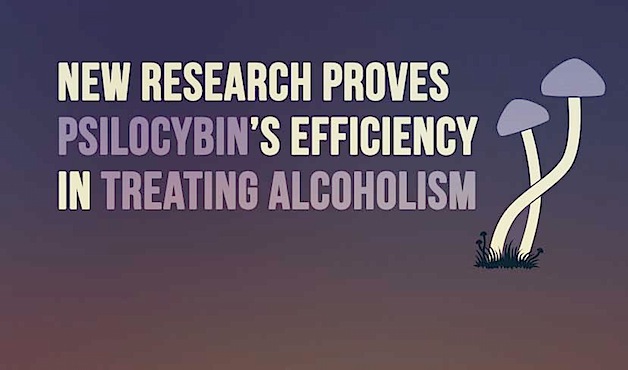February 1, 2015
By : Eevee G

Alcoholism is one of the most dangerous and common addictions of our time. The World Health Organization’s statistics show that over 140 million people worldwide are suffering from it. Alcoholism-related illnesses are the cause of death of more than 80,000 people a year in the US and of over 3 million people in the world. This makes it one of the first preventable causes of death (nearly 6% of all deaths are related to alcoholism).
With so many people having to deal with the problems of such kind of addiction, different studies have been held in order a reliable treatment to be found. One of the most recent studies, conducted at the University of New Mexico, found that using psilocybin can be an excellent way to treat alcoholism. Some of the people who were a part of the research team were Dr. Michael Bogenschutz and Dr. Rick Strassman- the author of “DMT: The Spirit Molecule” who has previously done research on DMT in the 1990s.
The study aimed to provide a foundation for more researches on the subject and to prove that this drug is reliable for treating alcohol addiction. The subjects of the experiment were only ten, but the evidence was enough to prove that this kind of treatment is not only an idea but a successfully working method.
The researchers’ team write that psilocybin’s effects have previously been explored in various studies, but there had not been done any on its effects on alcohol addicted people. This is why they decided to change that by treating volunteers with psilocybin in controlled sessions. During the study, the subjects were additionally treated using Motivational Enhancement Therapy methods. Also, they were provided with special sessions which had to prepare them for the psychedelic experiences.
Curing alcohol addiction requires really hard work and strong will and the path to sobriety is an extremely difficult one. That is why during the first four weeks of therapy, the abstinence from alcohol didn’t grow significantly. But during that period of time psilocybin sessions were not included. They were incorporated after these four weeks and this is when the amazing effects of the treatment happened- not only did the abstinence increase remarkably, but also these positive effects stuck even nine months later.
The researchers explain that the great effects of the treatment on the volunteers for the study during the first week looked promising and even “predicted change in drinking during weeks 5-8”. Also, what they noticed was that more intense incorporation of psilocybin sessions caused even greater progress.
Previous research on psilocybin and addictions
The first time when evidence for the great healing power of psychedelic therapy appeared was in the 1950s and 1960s. Unfortunately, it didn’t reach many people because of the War on Drugs movements during this period of time. But recently there had been shown other studies that prove psilocybin’s effectivity on treating other addictions, too. Matthew Johnson of the Johns Hopkins University found that it could be beneficial for treating tobacco addiction. His study revealed amazing proof by helping many people quit smoking. In even a more recent study, Johnson showed that people who described their psilocybin experience as more “mystical” were more prone to remaining tobacco-abstinent. “No significant differences in general intensity of drug effects were found between groups, suggesting that mystical-type subjective effects, rather than overall intensity of drug effects, were responsible for smoking cessation.” What that means is that Johnson discovered that what makes this psilocybin therapy so successful is not the dosage or intensity, but how “mystical” the experience is.
Expectations for the future
This new study not only reveals the healing powers of psilocybin when it comes to alcohol addiction, but it also serves as a solid foundation for further researches. It gives hopes for new studies that will prove its efficiency in treating other kinds of addiction as well. The research team concludes by saying: “These preliminary findings provide a strong rationale for controlled trials with larger samples to investigate efficacy and mechanisms.”






Leave a comment